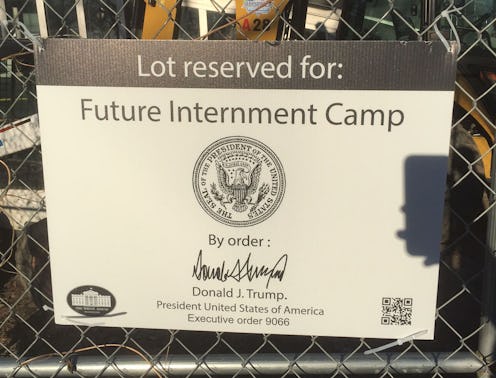News
These Trump Protest Signs Ask A Chilling Question

A Los Angeles-based artist by the name of Plastic Jesus is asking a provocative question with his newest project: is the possibility of internment camps in Trump's America that far fetched? The project is composed of propping a series of signed executive orders bearing the message "Lot reserved for: Future Interment Camp" and the president's signature on fences surrounding vacant lots.
On his website, Jesus writes:
A few month ago the idea that people would be prevented from traveling to the USA whilst holding the correct credentials would have sounded crazy. Or that people having travelled here legitimately would be detained for no reason and without legal representation. Or that Immigration snatch squads would wait outside schools or public meetings to apprehend people even though their immigration status is currently being processed by the USA government ... Not so far fetched now?
The use of the "Executive Order 9066" on the signs is purposeful. Executive Order 9066 was the order that President Franklin D. Roosevelt signed in 1942 to allow the removal of people, which forced more than 100,000 Japanese Americans from their homes and into internment camps. The signs have so far been installed in 10 different city locations throughout the country.
The echoes between Trump's proposed policies and plans and discriminatory practices of the past have been pointed out in the media since his days as a presidential candidate. When Kris Kobach, one of the president's spokespersons during the campaign revealed that the creation of a "Muslim registry" had been discussed by Trump's policy advisors — which Trump later endorsed on video — many articles pointed out the chilling similarity to the WWII registry of Jews living in Nazi Germany.
Another high-profile Trump supporter, Carl Higbie, fueled more concern when he appeared on The Kelly File and stated that previous American history regarding internment camps set a "precedent" for Kobach's proposed registry. "We’ve done it based on race, we’ve done it based on religion, we’ve done it based on region,” he said. “We’ve done it with Iran back — back a while ago. We did it during World War II with Japanese [. . .] There is historical, factual precedent to do things that are not politically popular and sometimes not right, in the interest of national security." While he insisted that he was against such measures, he still added, "We need to protect America first."
On Monday, President Trump signed an updated version of his travel ban on a list of countries with predominantly Muslim populations. His original executive order impacted countless people on its first day. According to recent reports, the president and his administration are considering implementing a policy that would separate mothers attempting to cross the U.S. border from their children.
Given these kinds of developments, Plastic Jesus' question is far from unreasonable.